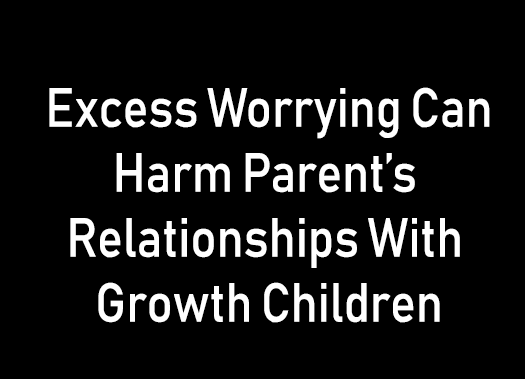Excess Worrying Can Harm Parent's Relationships With Grown Children

The amount of worry shared by parents and their grownup children can
feel like a warm comforter or wet blanket, a new University of Florida study
finds.
Just the right amount of concern could
solidify ties between parents and their adult children, but too much fretting
may become a burden to the relationship, said Elizabeth Hay, a UF psychology
professor, who led the research.
“If someone knows you worry about them, they may see it as an expression
of love and caring, but at the same time they can feel irritated and annoyed by
it,” said Hay, whose study is published in the December issue of the journal
Personal Relationships.
To date, most of the studies on worry don’t consider worries experienced
within the context of specific relationships and instead focus on pathological
worries or anxiety disorders, she said.
Worrying appears to reflect people’s investment in the relationship, Hay
said. Parents and their adult children felt more positively about their
relationships when the other party worried about them and conveyed their
concerns, she said.
At a certain point, however, expressing one’s unease to the other person
exacted a cost, Hay said. The more parents and adult children worry about one
another and discuss those worries, the more negatively the other party viewed
the relationship, she said.
“In a sense it’s socially and emotionally supportive to worry and share
your concerns, but you need to do it in a way that doesn’t make the other
person feel that you perceive them to be incapable of managing their own
affairs,” she said. “Perhaps they feel like you are undermining their autonomy,
and maintaining autonomy is important in parent-adult child ties.”
In the study, 70 percent of the adult children said their parents’
health was their biggest worry, while parents expressed a wide range of worries
relating to their adult children, according to an analysis she did for a second
paper that has not been published yet.
“The interesting thing is that many of the children in our study were in
their 20s and their parents were not of advanced age or experiencing any health
problems,” Hay said.
The study’s participants were 213 adult children – 110 daughters and 103
sons – between the ages of 22 and 49 and each of their mothers and fathers,
whose ages ranged from 40 to 84. They were interviewed by telephone in the
Philadelphia area from fall 2002 through fall 2003.
“Very few adults or their parents said they didn’t worry about each
other,” Hay said. “Almost everyone could identify a major worry that they could
clearly explain, and they reported thinking about it somewhat to a lot of the
time.”
Parents worry about their children largely as a continuation of patterns
that developed early in the relationship, Hay believes. “When children are
young and parents are responsible for so much of their life, they probably
worry about a variety of things, which is not likely to just suddenly stop once
their children become adults,” she said.
Indeed, while the focus of adult children’s worries overwhelmingly
centers on their parents’ health, parents had many diverse worries, the study
found. They talked about their children’s health, but they also mentioned
finances, relationship issues and problems in balancing work and family, Hay
said.
A small proportion of adults brought up more global concerns, such as
today’s world being a dangerous place, Hay said. The majority of parents
discussed anxieties that were specific to their own situation, though, such as
their child having an unsafe job, she said.
The study found that daughters fretted slightly more about their mothers
than fathers, while sons worried equally about both parents, Hay said. There
were no differences in how much mothers and fathers worried about their
daughters and sons, she said.
Worrying was also slightly greater in black families than in white ones,
the results showed. Participants in the study included 141 white and 66 black
families, with each family consisting of an adult child and two parents.
The study confirms that worrying is still very much a part of family
relationships once children have grown and moved out, she said.
“I think the take-home message would be that to a certain degree it is
normal to worry about your adult child or to worry about your parents, even if
it is before they get very old and have health problems,” she said.
Hay did the research with Karen Fingerman, professor of developmental
and family studies at Purdue University, and Eva Lefkowitz, professor of human
development and family studies at The Pennsylvania State University.
Reference:www.sciencedaily.com
Materials provided
by University of
Florida.

Add New Comment